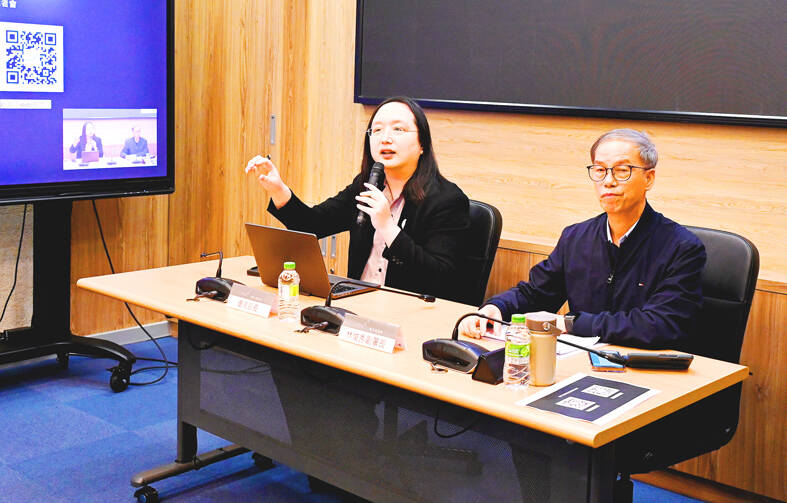The Cabinet on Thursday approved a slew of draft amendments to the Electronic Signatures Act (電子簽章法), specifying the legality of electronic signatures and introducing provisions to pave the way for their international interoperability.
The draft amendments to the act, a law that has been in effect since 2002, but has not undergone any amendments to date, were proposed by the Ministry of Digital Affairs and are to be sent to the Legislative Yuan for review, the Executive Yuan said.
Specifying that electronic signatures and signatures on paper have equal functionality and legality, the draft bill introduces a key provision stating that “electronic documents and electronic signatures shall not be denied solely because of their electronic form,” according to a document submitted to the Cabinet by the ministry.

Photo: Chu Pei-hsiung, Taipei Times
To facilitate mutual recognition of electronic signatures between Taiwan and the international community, the government would also be able to acknowledge the legality of electronic signatures issued by overseas and domestic institutions that comply with international standards, set by organizations such as the EU or the International Organization for Standardization, a ministry statement said.
“In terms of international application, as long as the certification technologies of both parties are interoperable and security conditions are equivalent, Taiwan’s courts can recognize the legality of the electronic documents,” the ministry said, including examples such as Acrobat Sign and DocuSign.
Deputy Minister of Digital Affairs Lee Huai-jen (李懷仁) told a news conference that one of the key points of the amendments is to work toward the integration of certification technologies with other nations.
He said that once certification authorities in foreign nations receive Taiwan’s approval, Taiwanese and foreign entities could use electronic signatures on their official documents.
Digital signatures are more secure than general electronic signatures in terms of effectiveness, strength and security standards, because digital signatures utilize encrypted private keys and are issued by government-approved certification authorities, Lee said.
Digital signatures use algorithms or other methods to process an electronic document into digital data and encrypt the signatory’s private key to create an electronic signature, the draft amendments say.
Minister of Digital Affairs Audrey Tang (唐鳳) said at a news conference at the ministry on Thursday afternoon that she had received support from different political parties regarding the draft amendments and hoped to pass them in this legislative session.
“In terms of the public, in any situation requiring a signature or seal, after the passage of the new [draft amendments to the] Electronic Signatures Act, individuals would be able to use electronic signatures as long as the other party does not object,” Tang said.
The ministry would put procedures in place to ensure digital signatures are verified before accounts associated with them are able to publish investment advertisements on Facebook, Google or Line — the three major online advertising platforms in Taiwan — to reduce investment fraud and fake advertising, she said.

A preclearance service to facilitate entry for people traveling to select airports in Japan would be available from Thursday next week to Feb. 25 at Taiwan Taoyuan International Airport, Taoyuan International Airport Corp (TIAC) said on Tuesday. The service was first made available to Taiwanese travelers throughout the winter vacation of 2024 and during the Lunar New Year holiday. In addition to flights to the Japanese cities of Hakodate, Asahikawa, Akita, Sendai, Niigata, Okayama, Takamatsu, Kumamoto and Kagoshima, the service would be available to travelers to Kobe and Oita. The service can be accessed by passengers of 15 flight routes operated by

Chinese spouse and influencer Guan Guan’s (關關) residency permit has been revoked for repeatedly posting pro-China videos that threaten national security, the National Immigration Agency confirmed today. Guan Guan has said many controversial statements in her videos posted to Douyin (抖音), including “the red flag will soon be painted all over Taiwan” and “Taiwan is an inseparable part of China,” and expressing hope for expedited reunification. The agency last year received multiple reports alleging that Guan Guan had advocated for armed reunification. After verifying the reports, the agency last month issued a notice requiring her to appear and explain her actions. Guan

GIVE AND TAKE: Blood demand continues to rise each year, while fewer young donors are available due to the nation’s falling birthrate, a doctor said Blood donors can redeem points earned from donations to obtain limited edition Formosan black bear travel mugs, the Kaohsiung Blood Center said yesterday, as it announced a goal of stocking 20,000 units of blood prior to the Lunar New Year. The last month of the lunar year is National Blood Donation Month, when local centers seek to stockpile blood for use during the Lunar New Year holiday. The blood demand in southern Taiwan — including Tainan and Kaohsiung, as well as Chiayi, Pingtung, Penghu and Taitung counties — is about 2,000 units per day, the center said. The donation campaign aims to boost

The Central Weather Administration (CWA) said a magnitude 4.9 earthquake that struck off the coast of eastern Taiwan yesterday was an independent event and part of a stress-adjustment process. The earthquake occurred at 4:47pm, with its epicenter at sea about 45.4km south of Yilan County Hall at a depth of 5.9km, the CWA said. The quake's intensity, which gauges the actual effects of a temblor, was highest in several townships in Yilan and neighboring Hualien County, where it measured 4 on Taiwan's seven-tier intensity scale, the CWA said. Lin Po-yu (林柏佑), a division chief at the CWA's Seismological Center, told a news conference